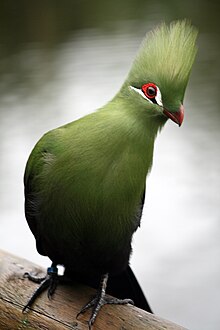Musophagiformes
| Turacos and relatives Temporal range: Oligocene - Holocene, 24–0 Ma |
|
|---|---|
 |
|
| Guinea turaco, Tauraco persa, at Birds of Eden aviary, South Africa | |
| Scientific classification | |
| Kingdom: | Animalia |
| Phylum: | Chordata |
| Class: | Aves |
| Clade: | Otidimorphae |
| Order: |
Musophagiformes Seebohm, 1890 |
| Family: |
Musophagidae Lesson, 1828 |
| Genera | |
| Synonyms | |
|
|
The turacos make up the bird family Musophagidae (literally "banana-eaters"), which includes plantain-eaters and go-away-birds. In southern Africa both turacos and go-away-birds are commonly known as loeries. They are semi-zygodactylous – the fourth (outer) toe can be switched back and forth. The second and third toes, which always point forward, are conjoined in some species. Musophagids often have prominent crests and long tails; the turacos are noted for peculiar and unique pigments giving them their bright green and red feathers.
Traditionally, this group has been allied with the cuckoos in the order Cuculiformes, but the Sibley-Ahlquist taxonomy raises this group to a full order Musophagiformes. They have been proposed to link the hoatzin to the other living birds, but this was later disputed. Recent genetic analysis have strongly supported the order ranking of Musophagiformes.
Musophagids are medium-sized arboreal birds endemic to sub-Saharan Africa, where they live in forests, woodland and savanna. Their flight is weak, but they run quickly through the tree canopy. They feed mostly on fruits and to a lesser extent on leaves, buds, and flowers, occasionally taking small insects, snails, and slugs. As their name suggests, turacos enjoy bananas and can become so tame as to be hand-fed. They are also partial to grapes and pawpaw (papaya).
They are gregarious birds that do not migrate but move in family groups of up to 10. Many species are noisy, with the go-away-birds being especially noted for their piercing alarm calls, which alert other fauna to the presence of predators or hunters; their common name is onomatopoeia of this. Musophagids build large stick nests in trees, and lay 2 or 3 eggs. The young are born with thick down and open, or nearly-open, eyes.
...
Wikipedia
